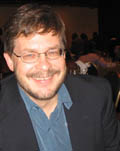Growing up in St. Petersburg Russia, Sergei Nekhai, PhD had an early interest in physics and math. During his education at a science focused boarding school, Dr. Nekhai was introduced to microbiology and human genetics by Dr. Andrey Kozlov. Now a Director of the AIDS Center in St. Petersburg, Dr. Kozlov had just returned to Russia following postdoctoral training with Dr. Robert Gallo at NIH. Dr. Nekhai then attended State Polytechnic University in St. Petersburg, where he received his MS in biophysics and continued his studies at the Petersburg Nuclear Physics Institute, where he received his PhD. He then moved to The George Washington University for his postdoctoral training with Dr. Ajit Kumar, who encouraged him to focus on HIV research. Dr. Nekhai notes that because of his knowledge of RNA-protein interactions he was able to quickly transition into HIV research, a field in which he has worked for the past 20 years.
Dr. Nekhai’s passion for proteomics and transcription continues to be at the forefront of his work. Now a Professor in the Department of Medicine at Howard University and Co-director of the Center for Sickle Cell Disease and Director of the RCMI Proteomics Core Facility, he is focusing on HIV transcription and the conditions in which sickle cell disease may influence infection. Specifically, Dr. Nekhai examines the molecular mechanisms of HIV infection in sickle cells and the effects of low oxygen and hypoxia on HIV. His current research focuses on the protective factors against HIV infection of sickle cells and those who carry the sickle cell trait. He is also expanding into sickle cell research exploring a protein factor that may predict or explain predisposition of sickle cell patients and the trait carriers to kidney and lung dysfunction.
Most recently, Dr. Nekhai used his work in HIV to expand into Ebola research. He and his team at the Center for Sickle Cell Disease have developed a small molecule that targeted the host enzyme protein phosphatase-1, which acts as an inhibitor of HIV-1 transcription. He describes that while HIV and Ebola viruses are very different they seem to reproduce in the cell using similar host protein phosphatase-1, and explains, “We are now testing [the inhibitor] on Ebola. And it seems to be working.” Using his background in proteomics and virology of HIV and Sickle Cell Disease, Dr. Nekhai says his goal is to develop a post exposure drug that could treat or prevent Ebola in humans at risk.
As Co-Director of the DC CFAR Basic Sciences Core, Dr. Nekhai hopes to further facilitate multidisciplinary collaborations on HIV-1 and promote the use of proteomics for HIV-1 studies.


